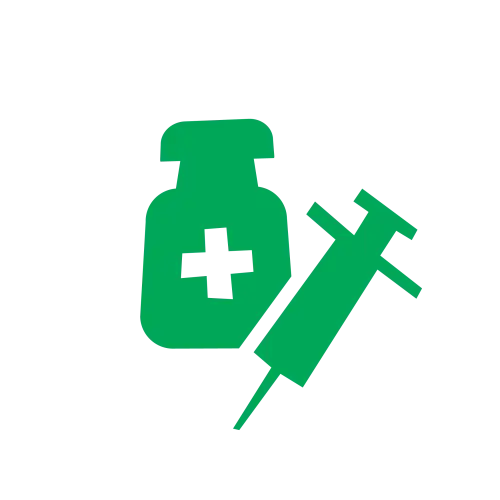Genital Herpes: Understanding, Managing, and Breaking Down Taboos
Receiving a genital herpes diagnosis can be a source of anxiety, primarily because of the taboos surrounding this infection. The first thing to know is that you are not alone: herpes is an extremely common condition.
In Canada, it is estimated that nearly 1 in 7 people is infected with HSV-2 (the type most often associated with genital herpes), and that more than half the population has been exposed to HSV-1.
The biggest challenge is often not medical, as herpes is a completely manageable condition. The real challenge is overcoming stigma. For more information and to receive support, consult this brochure from Info Herpes: https://www.infoherpes.org.
Transmission: The real issue is asymptomatic viral shedding
Herpes is transmitted through direct skin-to-skin contact with an infected area.
The key concept to understand is asymptomatic viral shedding. This means the virus can be present on the surface of the skin (and therefore transmissible) even in the complete absence of lesions or symptoms. This is, in fact, how the majority of transmissions occur.
This reality makes open communication with partners absolutely essential.
HSV-1 vs. HSV-2: What's the difference?
Herpes is caused by the herpes simplex virus (HSV), which exists in two types:
- HSV-1: Historically associated with "cold sores" around the mouth.
- HSV-2: Historically associated with genital herpes.
Today, this distinction is less rigid. Both types of the virus can cause infections in the genital or oral region. Knowing your HSV type can sometimes help in anticipating the frequency of recurrences, but the management of the infection remains the same.
What are the symptoms?
Symptoms, when present, manifest at the site of infection, but also near it. They could therefore be apparent around the eyes, nose, or on the buttocks, for example.
A person who contracts herpes will experience a more intense first episode of symptoms, called the primary infection, and will then experience recurrent episodes of symptoms that are generally less intense and less frequent over time.
1 - Primary infection
A first outbreak occurs on average 6 days after infection and lasts on average between 1 and 3 weeks without medication. The main symptoms are small blisters near the genitals or mouth that turn into painful ulcers, and flu-like symptoms (fever, headache, fatigue, body aches). This episode is considered the most intense and the longest.
2 - Recurrent episodes
The duration and intensity of symptoms vary considerably from one person to another, but they tend to decrease over time. The person may also experience prodromes, small warning signs that occur 24 to 48 hours before the appearance of lesions.
3 - Asymptomatic shedding episodes
Even if no other symptoms are visible, this shedding is contagious. It means the virus is "strong" enough to reach the surface of the skin and be transmitted, but not enough to cause a lesion. These asymptomatic periods can occur between recurrent episodes without the person knowing it.
Complications from a herpes infection are rare but can be serious, such as encephalitis or meningitis.
The primary infection: what happens the first time?
The first herpes outbreak, called the primary infection, is often the most intense and the longest. It is your body's reaction to encountering the virus for the first time.
What to expect?
In addition to lesions (vesicles, ulcers), the primary infection can be accompanied by flu-like symptoms:
- Fever
- Headaches
- Muscle aches
- Swollen lymph nodes
These symptoms generally disappear in 2 to 3 weeks.
What to do during a primary infection?
- Consult quickly: It is important to get a medical diagnosis. A swab from a fresh lesion can confirm the diagnosis and determine the HSV type.
- Start an antiviral treatment: An antiviral treatment (like valacyclovir) prescribed during the primary infection is very effective at reducing the duration and intensity of symptoms.
- Manage the discomfort: Follow the advice below to relieve pain and discomfort.
It is important to know that subsequent outbreaks (recurrences) are almost always less severe and shorter than the primary infection.
Managing an outbreak: Your pharmacist's advice
A herpes outbreak is marked by the appearance of small vesicles or ulcers. Here is some advice to manage the discomfort:
- Keep the area clean and dry: Gently clean with mild soap and water, then pat dry.
- Relieve the pain: Consider cold compresses, warm sitz baths, or an over-the-counter pain reliever like acetaminophen or ibuprofen.
- Identify your triggers: Stress, fatigue, or menstruation can sometimes trigger a recurrence. Learning what they are can help you manage them.
Treatment strategies: Episodic vs. Suppressive
There is no cure for herpes, but antiviral medications (like valacyclovir) are extremely effective at controlling the virus. There are two ways to use them:
Episodic treatment:
- What is it? Taking antivirals for a short period (1 to 5 days) at the very first signs of an outbreak.
- Its purpose? To shorten the duration of the outbreak and reduce the intensity of symptoms.
- Who is it for? Ideal for people who have infrequent recurrences (fewer than 6 per year).
Suppressive treatment:
- What is it? Taking a dose of antivirals every day, continuously, even without symptoms.
- Its purpose? To prevent outbreaks, significantly reduce the risk of transmission to a partner, and decrease anxiety related to this risk.
- Who is it for? Recommended for people with frequent recurrences or who wish to reduce the risk of transmission to their partner(s).
A discussion with one of our pharmacists can help you choose the option best suited to your situation.
Living with herpes and protecting yourself
Living with herpes means learning to manage a common chronic health condition and remembering that it does not change your worth.
Combined prevention remains your best ally: the condom reduces the risk of transmission, and suppressive therapy is a very powerful tool to protect your partners. The most important thing is to have access to accurate information and non-judgmental support, which is exactly what our team is here to offer you.


















